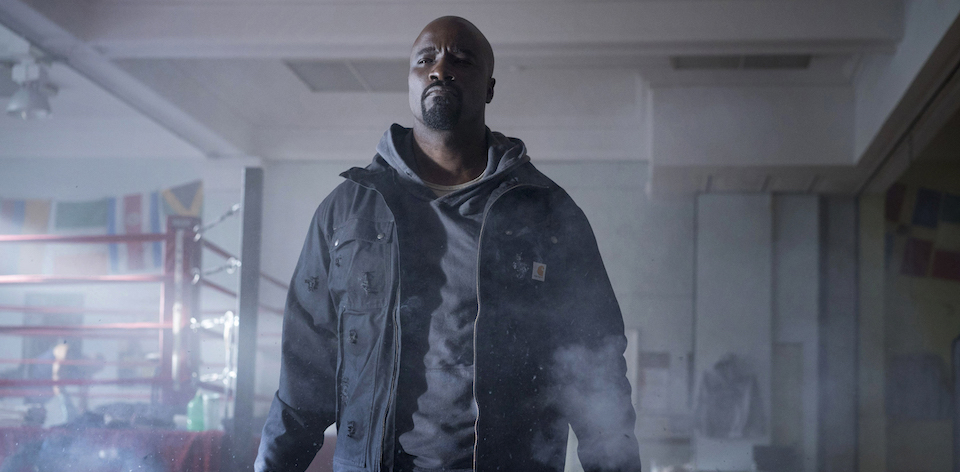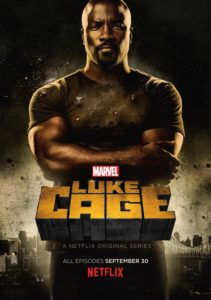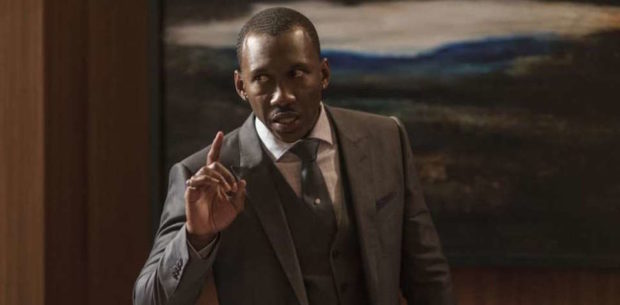Marvel won’t be stopped until they’ve dominated all forms of media. From comic book beginnings, Marvel Studios has its sticky fingers in cinematic, televisual and streaming pies, and for the most part is showing the Distinguished Competition how it should be done. LUKE CAGE follows Daredevil and Jessica Jones in bringing the superhero fight to the mean streets of Netflix, and while it might be a slower burner than its predecessors, and lacking a solid hook, it is nevertheless an important entry in the Marvel canon.
Ex-con Luke Cage (Mike Colter), imbued with super strength and unbreakable skin due to an experiment gone wrong in prison, is back on the streets of Harlem trying to stay low key. Yet as a power play for the area breaks out between mob boss Cornell “Cottonmouth” Stokes (Mahershala Ali) and his politician cousin Mariah Dillard (Alfre Woodard), Cage must decide whether he should step up and use his powers for good, or continue to fly under the radar.
Many superhero adaptations talk about bringing comic books into the real world, but this might be the closest we have come to seeing that. LUKE CAGE is an incredibly aware show, not just embracing the rich black cultural history of New York and Harlem, but by actively commenting on social issues that continue to make headlines. “There’s something powerful about seeing a black man who is bulletproof and unafraid,” is uttered aloud, a meme that runs throughout the series, and Marvel and show creator Cheo Hodari Coker (Notorious, TV’s NCIS: Los Angeles) are highly conscious of this. As a manhunt takes place for Cage, the intent of overt scenes of police brutality and “stop and frisk” policies is not lost. All credit should go to the show for taking such a firm stance on the eve of a divisive US election.
So it’s a shame that almost everything else in LUKE CAGE is played by the book. Wrapped in a facade of faux exploitation films and hip hop noir, the show plods its way through alternating scenes of oppressively repetitive gunfire and posturing. Indeed, by the middle of the series, there’s a overwhelming sense that every conversation is simply a delaying tactic, as if the writing team of a dozen people hadn’t consulted with each other and were collectively told to spread too little narrative over too much digital space. Here we start to see the limitations of the expected Netflix binge structure, one that necessitates a certain length to the series. While there are peaks and troughs of cool and important moments throughout, this is not a story that needed 698 minutes to tell.
Cage himself is a fascinating hero, one that spends much of the series denying that moniker. Yet he isn’t granted a great deal of dimensionality in this series, somehow even less than his supporting role in Jessica Jones. For the most part, he’s a tank with legs, given a Wolverine-esque backstory and only conflicted as to how much good he is going to do. Far more interesting is the reappearance of ‘Night Nurse’ Claire Temple (Rosario Dawson), a rounded character that admittedly has the benefit of four seasons of cameos to pad out her character, but she is given the best lines and moments. The introduction of detective Misty Knight (Simone Missick) will probably do more for existing Marvel fans than it will for new viewers, as she mostly plays the well-worn trope of the skeptical cop with a heart of gold.
The show is sometimes unsure as to which villain will pose the real threat, and the four potential choices are all less than menacing as a result. Cottonmouth and Mariah disappear for episodes at a time, while Willis “Diamondback” Stryker (Erik LaRay Harvey) and henchman Hernan “Shades” Alvarez (Theo Rossi) are so ill-defined as to make them perfunctory. Unlike Daredevil‘s Kingpin, or Jessica Jones‘ Purple Man, there’s just no constancy to their sense of threat. As a result of this, the non-ending simply sputters out into an anti-climax, which might keep with the realism credo, but leaves the audience without as satisfying a payoff after half a day’s worth of viewing.
There’s a strong story behind LUKE CAGE, and his extensive comic book history is referenced in some wonderful Easter eggs throughout the 13 episodes of the show. Yet if this story had been half the length, or even showcased in a feature film, it would have had twice as much impact. Even the final episode, one of the shortest of the series, feels as though it has wrapped up 15 minutes into its running time, and the rest is just spinning its wheels. Maybe that’s the Marvel credo at this point, building up to The Defenders on the small screen and the next Avengers on the bigger screens. Either way, as good as LUKE CAGE is, we know Marvel can (and will) do better.
[stextbox id=”grey” bgcolor=”F2F2F2″ mleft=”5″ mright=”5″ image=”null”]2016 | US | Creator: Cheo Hodari Coker | Cast: Mike Colter, Mahershala Ali, Simone Missick, Theo Rossi, Erik LaRay Harvey, Rosario Dawson, Alfre Woodard | Distributor: Netflix | Episodes: 13[/stextbox]






